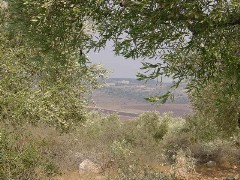 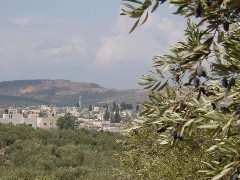 The
sounds of Zababdeh: The
sounds of Zababdeh:
4:45 AM, Muslim prayer (40 sec.) 6:00 AM, Church bells (40 sec.) 6:30 AM, sheep 7:30 AM, National Anthem (40 sec.) 24-7, Electrical generator (5 sec.) |
|
11/2/00: There were two masses today. The first took place during school in memory and honor of all of the martyrs of the current Intifada. The second was in the afternoon, in memory of all those who had died during the last year (we remembered later that it was - approximately - All Saints' Day). Following church was a procession to the cemetery to remember the dead. As we left, families of the grieving were giving candy to all those who came. Somehow a more honorable way of doing Halloween. |
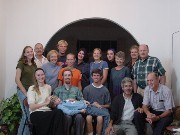 11/4/00:
Reverse culture shock. Tonight we had a "surprise birthday party"
and "potluck" for one of the American girls who lives next door.
Amidst all of the Americans (other than us, connected with the Arab-American
University of Jenin - impressive given the political climate) were
one Irishman and a German. In addition to everything else, we played
charades (have you ever tried to act out Ishtar?). 11/4/00:
Reverse culture shock. Tonight we had a "surprise birthday party"
and "potluck" for one of the American girls who lives next door.
Amidst all of the Americans (other than us, connected with the Arab-American
University of Jenin - impressive given the political climate) were
one Irishman and a German. In addition to everything else, we played
charades (have you ever tried to act out Ishtar?). |
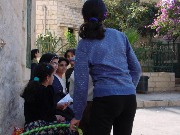 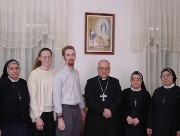 11/5/00:
Sunday afternoon is when the children of the parish gather for games (video
- 16 sec.) out in front of the church under the watchful eye of the sisters.
There is a project underway to help turn the old school building into a
village hall so that such ministries can thrive (particularly in winter
time). We were also excited to have an afternoon visit from the Latin
Patriarch of Jerusalem, Bishop Michel Sabbah. He has been very active
these days visiting most of the parishes in the West Bank and assessing
the situation - particularly in heavy-hit Christian towns like Beit Jala
and Beit Sahour. He shared tragic stories of Christian families losing
their homes and savings to Israeli rockets. 11/5/00:
Sunday afternoon is when the children of the parish gather for games (video
- 16 sec.) out in front of the church under the watchful eye of the sisters.
There is a project underway to help turn the old school building into a
village hall so that such ministries can thrive (particularly in winter
time). We were also excited to have an afternoon visit from the Latin
Patriarch of Jerusalem, Bishop Michel Sabbah. He has been very active
these days visiting most of the parishes in the West Bank and assessing
the situation - particularly in heavy-hit Christian towns like Beit Jala
and Beit Sahour. He shared tragic stories of Christian families losing
their homes and savings to Israeli rockets. |
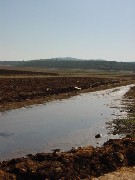 11/6/00:
We headed off on one of our frequent afternoon walks with our neighbor
from the university (we say neighbor, but he has also been kind enough
to be our translator, our tour guide, our expert chef, our bargain-hunter).
In recent days we've detected the odor of olives everywhere we go - when
farmers take their olives to the press, they not only get the oil - they
also get the solid and liquid waste matter. Because there are no facilities
to deal with the stuff, they dump it where they can. Our neighbor
is seeking funding for a project which would use the waste for other things
like fuel and animal feed. This has attracted Elizabeth's environmental
attention, particularly as the wastes can have pretty devastating effects
on the land - we're told it takes years for the soil to recover from the
toxins. 11/6/00:
We headed off on one of our frequent afternoon walks with our neighbor
from the university (we say neighbor, but he has also been kind enough
to be our translator, our tour guide, our expert chef, our bargain-hunter).
In recent days we've detected the odor of olives everywhere we go - when
farmers take their olives to the press, they not only get the oil - they
also get the solid and liquid waste matter. Because there are no facilities
to deal with the stuff, they dump it where they can. Our neighbor
is seeking funding for a project which would use the waste for other things
like fuel and animal feed. This has attracted Elizabeth's environmental
attention, particularly as the wastes can have pretty devastating effects
on the land - we're told it takes years for the soil to recover from the
toxins. |
|
11/9/00-11/12/00: Our Journey to Jerusalem - the long-awaited saga. Our automatic you're-an-American-so-shalom-for three-months tourist visas were near their expiration, and so we were in contact with the Latin Patriarchate to acquire work visas. All we needed to do was get to the Holy City (easier said than done). We discovered at the last minute that one of the French teachers was headed there on some business, and French Consular plates are a good way to travel through checkpoints these days. Even so, we headed out late and the road from Zababdeh to Jenin was blocked by signs of protest - burning tires, cars, boys throwing rocks at the Israeli military encampment. We saw that they pretty much blocked the road, and we heard some gunfire from the camp in response. In the past few days, there have been some gun battles at the camp, mostly at night, and thankfully without any of the awful results we've seen elsewhere. (Don't worry. Some people who live outside the village and near the camp have had sleepless nights, but the camp is a ways outside the village and far from our home.) For some reason there seems to be restraint in Zababdeh. In any case, we played it safe and drove through the fields to avoid the scene and reconnected with the road as it went up through the hills. At the Palestinian checkpoint, Marthame's unstamped passport (brand new) raised enough questions that a soldier accompanied us on our ride to the other side of Jenin. At the Israeli checkpoint (at the entrance to Israel), the road was completely blocked with no soldiers in sight. 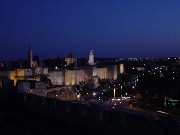 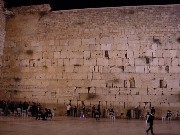 We
finally found one, who refused to let us go through (Palestinian sympathizers
we seem to be), until it was clear that we were not backing down.
Marthame moved the barricades aside with the soldier's permission. Sorry
not to offer photos of that, but we figured it would be best not to test
our luck. Once in Jerusalem, we connected with the Patriarchate
who found us a very nice place to stay in the Old City (our nighttime view
to the left, with video - 12 sec. - of
a walk through town). We also connected with a Palestinian
friend, a teacher and part-time tour guide, who gave us a late-night wandering
tour through the Old City. The city was deserted - travel warnings have
kept the tourists away. At the Western Wall (right) our friend was stopped,
harrassed, and humiliated for ten minutes by the Israeli security (as we
watched) for no other apparent reason that the fact that he's Palestinian.
His response to us was that he's "used to it" - something even more shameful
than the humiliation itself. We
finally found one, who refused to let us go through (Palestinian sympathizers
we seem to be), until it was clear that we were not backing down.
Marthame moved the barricades aside with the soldier's permission. Sorry
not to offer photos of that, but we figured it would be best not to test
our luck. Once in Jerusalem, we connected with the Patriarchate
who found us a very nice place to stay in the Old City (our nighttime view
to the left, with video - 12 sec. - of
a walk through town). We also connected with a Palestinian
friend, a teacher and part-time tour guide, who gave us a late-night wandering
tour through the Old City. The city was deserted - travel warnings have
kept the tourists away. At the Western Wall (right) our friend was stopped,
harrassed, and humiliated for ten minutes by the Israeli security (as we
watched) for no other apparent reason that the fact that he's Palestinian.
His response to us was that he's "used to it" - something even more shameful
than the humiliation itself.
Monday we joined the French Consular team ;-) early in the morning on our way to Zababdeh. We were first pulled over by Israeli police, stopped, questioned, and let go. When we asked if there was a problem, they replied, "no, no problem." Then we were questioned again at the Israeli crossing point, as streams of settler vehicles going to work headed the other way. Again, we were permitted to go after being questioned for a while. It gets tiring, but it was good to be back. Many of the students wanted to know where we had been on Saturday. Apparently there was a rumor that we had left for the States. When we said we were getting visas, they asked if they were exit visas. Everyone seemed happy and relieved to have us here - and that was true for us, too. |
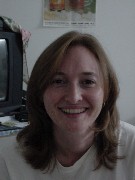 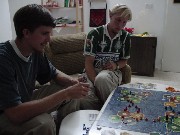 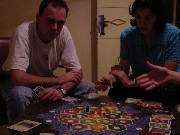 11/14/00:
A return to "normal" life of teaching, despite one international incident
emanating from Zababdeh. The Patriarchate has an essay contest for
English students to write about the current situation. We were encouraged
to submit extraordinary ones early to the head of the Patriarchate's English
program so that they might be published in the States. One of our
students had a beautiful piece published by the Holy
Land Christian Ecumenical Fund web site, which raised some hackles
(you can read the essay and comments on it on the website if you're curious)
- enough so that the school was visited by officials concerned that such
a voice was coming out of Zababdeh. On a lighter note, Elizabeth
got a haircut and we introduced some new recruits to the German board game
Siedler (somehow inappropriately involving the building of settlements
and the seizing of natural resources). 11/14/00:
A return to "normal" life of teaching, despite one international incident
emanating from Zababdeh. The Patriarchate has an essay contest for
English students to write about the current situation. We were encouraged
to submit extraordinary ones early to the head of the Patriarchate's English
program so that they might be published in the States. One of our
students had a beautiful piece published by the Holy
Land Christian Ecumenical Fund web site, which raised some hackles
(you can read the essay and comments on it on the website if you're curious)
- enough so that the school was visited by officials concerned that such
a voice was coming out of Zababdeh. On a lighter note, Elizabeth
got a haircut and we introduced some new recruits to the German board game
Siedler (somehow inappropriately involving the building of settlements
and the seizing of natural resources). |
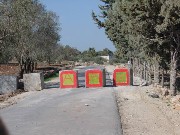 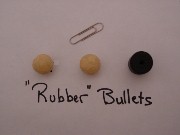 11/15/00:
Happy July 4th - Palestinian Independence Day. School was closed,
celebrating the 12th anniversary of the State that is independent with
no land or capital. Israel has instituted a full closure not only
of the West Bank and Gaza, but between "major population" areas - or so
they say. We had to take several different roads before we could
even get from Zababdeh to Jenin. Fortunately, one roadblock was liberated
(i.e. the huge concrete block was pulled aside) apparently by a Palestinians
farmers' bulldozer. The closures have devastated the economy as well
as the soul - workers can't get to their jobs in Israel or even in other
cities on the West Bank; supplies and replacement parts for machinery can't
get in. Supposedly medicine and food are being allowed to enter,
but we have heard that even these are sometimes refused or severely delayed.
We were able to do some much-needed shopping in Jenin with our good friend/neighbor/translator/negotiator/master
chef. Word has come that the Israeli camp near Zababdeh is scheduled
to be vacated - which would calm many nerves around here. The sound
of training gunfire (audio - 5 sec.) can
only contribute to the general sense of anxiety here. We took a look at
some of the things that can emerge from the gunfire - above see "rubber"
bullets collected by friends in Nazareth - the core is metal, and the exterior
is hard rubber. It's like a hockey puck shot with a force of one
ton. So many Israeli planes are flying over these days it feels like
the runway at O'Hare. 11/15/00:
Happy July 4th - Palestinian Independence Day. School was closed,
celebrating the 12th anniversary of the State that is independent with
no land or capital. Israel has instituted a full closure not only
of the West Bank and Gaza, but between "major population" areas - or so
they say. We had to take several different roads before we could
even get from Zababdeh to Jenin. Fortunately, one roadblock was liberated
(i.e. the huge concrete block was pulled aside) apparently by a Palestinians
farmers' bulldozer. The closures have devastated the economy as well
as the soul - workers can't get to their jobs in Israel or even in other
cities on the West Bank; supplies and replacement parts for machinery can't
get in. Supposedly medicine and food are being allowed to enter,
but we have heard that even these are sometimes refused or severely delayed.
We were able to do some much-needed shopping in Jenin with our good friend/neighbor/translator/negotiator/master
chef. Word has come that the Israeli camp near Zababdeh is scheduled
to be vacated - which would calm many nerves around here. The sound
of training gunfire (audio - 5 sec.) can
only contribute to the general sense of anxiety here. We took a look at
some of the things that can emerge from the gunfire - above see "rubber"
bullets collected by friends in Nazareth - the core is metal, and the exterior
is hard rubber. It's like a hockey puck shot with a force of one
ton. So many Israeli planes are flying over these days it feels like
the runway at O'Hare. |
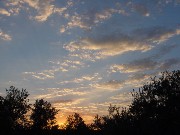 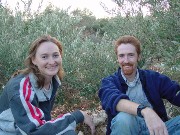 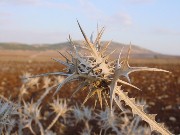 11/16/00:
This morning, administrators at the school were busy accomodating the absence
of one of the French teachers. On his way from Nazareth (where his wife
was awaiting the birth of their second child) to Zababdeh, he was stopped
at the Israeli checkpoint, and told he may not enter the West Bank. In
spite of his protests, and in spite of the fact he was driving a consular
vehicle, they refused him. He told us that last year, when their first
child was born, he commuted between Nazareth and Zababdeh every day. But
this year, it has been exhausting and frighteneing, even when he does get
through. Fortunately, most of the other teachers and students are
able to come, so the school continues mostly uninterrupted. In the
afternoon, we joined our neighbor on a walk through the hills around Zababdeh
(video - 24 sec.). Elizabeth has
begun compiling photos for a future "nature page" featuring the local flora
and fauna (ranging from beautiful thorny shrubs and praying mantises
in the hills to the "icky 11/16/00:
This morning, administrators at the school were busy accomodating the absence
of one of the French teachers. On his way from Nazareth (where his wife
was awaiting the birth of their second child) to Zababdeh, he was stopped
at the Israeli checkpoint, and told he may not enter the West Bank. In
spite of his protests, and in spite of the fact he was driving a consular
vehicle, they refused him. He told us that last year, when their first
child was born, he commuted between Nazareth and Zababdeh every day. But
this year, it has been exhausting and frighteneing, even when he does get
through. Fortunately, most of the other teachers and students are
able to come, so the school continues mostly uninterrupted. In the
afternoon, we joined our neighbor on a walk through the hills around Zababdeh
(video - 24 sec.). Elizabeth has
begun compiling photos for a future "nature page" featuring the local flora
and fauna (ranging from beautiful thorny shrubs and praying mantises
in the hills to the "icky 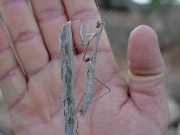 bugs"--according
to Marthame--we find in our apartment). bugs"--according
to Marthame--we find in our apartment). |
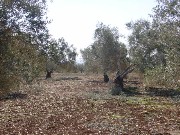 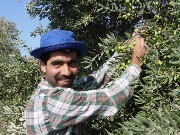 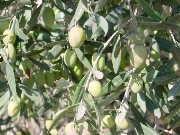
11/17/00: One of the last days of the olive harvest this year. Further away from Zababdeh, because of the slightly differing climate, the harvest is later than near the town. We joined one of the families that has become dear to us to harvest their olives in nearby Burqin. Tradition holds that it was in Burqin that Jesus healed the ten lepers (Luke 17:11-19), and there is an Orthodox church on the site that we hope to visit soon. Because of the size of the olive grove, local families are hired to help. Some, in order to speed up the process, beat the trees with a stick (video - 10 sec. - it sounds like rain, but it is the sound of olives hitting the tarp below). Others sift the olives from the leaves with the help of gravity, weight, and the wind (video - 5 sec.). Even others help by riding the donkey (we're not sure how this helps, but we have video of Elizabeth doing just that - 5 sec.). It was kind of like Palm Sunday far too early. 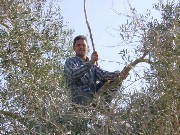 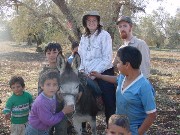 |
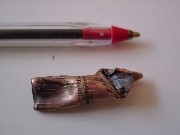 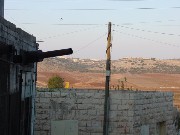 11/18/00:
Although we continue to remain safe in Zababdeh, there has been shooting
at the nearby military training camp at night. Past the other side
of town - up in the hills - provides the best access to shoot into the
military camp. The Israelis have, of course, responded. There
has been no word of any injuries or fatalities on either side, though some
homes up in the hills have received some minor damage. Note: We
do not live in the hills. Nor do we go into the hills at night.
Between us and the military camp is a very large and very solid Latin School.
We
are beginning to feel the effects of the closure more directly. Because
of the unavailability of petrol, the generator is turned off between 2:00
and 4:00 in the afternoon (audio - 5 sec.
Compare with the generator in the "sounds of Zababdeh" above). It
is remarkably peaceful, but makes accomplishing computer work that much
more difficult. 11/18/00:
Although we continue to remain safe in Zababdeh, there has been shooting
at the nearby military training camp at night. Past the other side
of town - up in the hills - provides the best access to shoot into the
military camp. The Israelis have, of course, responded. There
has been no word of any injuries or fatalities on either side, though some
homes up in the hills have received some minor damage. Note: We
do not live in the hills. Nor do we go into the hills at night.
Between us and the military camp is a very large and very solid Latin School.
We
are beginning to feel the effects of the closure more directly. Because
of the unavailability of petrol, the generator is turned off between 2:00
and 4:00 in the afternoon (audio - 5 sec.
Compare with the generator in the "sounds of Zababdeh" above). It
is remarkably peaceful, but makes accomplishing computer work that much
more difficult. |
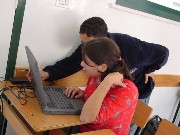 11/20/00:
Today Marthame began an internet project with the Tawjihi (12th grade)
students at the school. This is the year that they have their comprehensive
exams for university, so their interest in religion class was pretty minimal.
He has connected the students here with the Youth Group at Covenant Presbyterian
Church (Lubbock, Texas). The students are ecstatic (a nice change
from their approach to religion classes before) and eager to learn more
and more about each other as time goes on. Marthame is still hoping
to do similar projects with other American church groups. 11/20/00:
Today Marthame began an internet project with the Tawjihi (12th grade)
students at the school. This is the year that they have their comprehensive
exams for university, so their interest in religion class was pretty minimal.
He has connected the students here with the Youth Group at Covenant Presbyterian
Church (Lubbock, Texas). The students are ecstatic (a nice change
from their approach to religion classes before) and eager to learn more
and more about each other as time goes on. Marthame is still hoping
to do similar projects with other American church groups. |
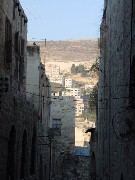 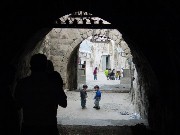 11/22/00:
A quick getaway from Zababdeh. We headed down to Nablus with our
neighbor. The road was open the whole way their (a nice change).
However, we were stopped by three plainclothes Palestinian soldiers in
an unmarked car. Apparently the German plates and the red-headed
guy in the front seat aroused some suspicion. Nevertheless, they
were incredibly apologetic for having to pull us over and ask us for identification
- something we've never encountered from Israeli soldiers. It was
a nice visit to wander around the Old City, eat kanaffe (a very famous
very delicious Palestinian dessert) and msakhan (a very famous very delicious
Palestinian main course). One of our fears in making such trips is
that we will be mistaken for Israelis by Palestinian youths. But
one moment in this visit seems to undercut this concern. When our
Palestinian neighbor/friend/guide asked a young man for directions in Arabic,
he was answered politely (and correctly) in Hebrew. We were mistaken
for Israelis, but we were not attacked, harangued, assaulted, stoned.
Nevertheless, we corrected his mistake. 11/22/00:
A quick getaway from Zababdeh. We headed down to Nablus with our
neighbor. The road was open the whole way their (a nice change).
However, we were stopped by three plainclothes Palestinian soldiers in
an unmarked car. Apparently the German plates and the red-headed
guy in the front seat aroused some suspicion. Nevertheless, they
were incredibly apologetic for having to pull us over and ask us for identification
- something we've never encountered from Israeli soldiers. It was
a nice visit to wander around the Old City, eat kanaffe (a very famous
very delicious Palestinian dessert) and msakhan (a very famous very delicious
Palestinian main course). One of our fears in making such trips is
that we will be mistaken for Israelis by Palestinian youths. But
one moment in this visit seems to undercut this concern. When our
Palestinian neighbor/friend/guide asked a young man for directions in Arabic,
he was answered politely (and correctly) in Hebrew. We were mistaken
for Israelis, but we were not attacked, harangued, assaulted, stoned.
Nevertheless, we corrected his mistake. |
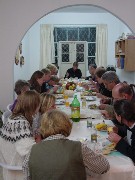 11/23/00:
Happy Thanksgiving! Yes, we ate turkey. And stuffing.
And sweet potatoes. And cranberry sauce (with the lines from the
can and everything). Here in Zababdeh are the remnants of the American
ex-pat community in the West Bank, all twenty to thirty of us. We
were able to give thanks for our continued safety, and for the fact that
we remain together with other Westerners to look to for support in these
difficult times. Following school today, folks from the Palestinian
Ministry of Education came to the school to talk with the teachers about
how best to teach in the midst of the Intifada. The effect of the
daily news on everyone - teachers and students alike - is being recognized.
At the very least, it was a chance for the teachers to share their own
anxieties and frustrations. 11/23/00:
Happy Thanksgiving! Yes, we ate turkey. And stuffing.
And sweet potatoes. And cranberry sauce (with the lines from the
can and everything). Here in Zababdeh are the remnants of the American
ex-pat community in the West Bank, all twenty to thirty of us. We
were able to give thanks for our continued safety, and for the fact that
we remain together with other Westerners to look to for support in these
difficult times. Following school today, folks from the Palestinian
Ministry of Education came to the school to talk with the teachers about
how best to teach in the midst of the Intifada. The effect of the
daily news on everyone - teachers and students alike - is being recognized.
At the very least, it was a chance for the teachers to share their own
anxieties and frustrations. |
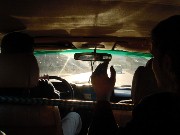 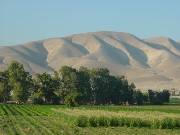 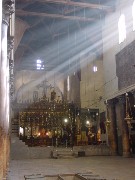 11/24/00:
Another foray out of Zababdeh. Friday is the day that Abuna Louis
heads down to Bethlehem to teach tour guides at the University. We
took advantage of this, and a slight improvement in travel restrictions,
and joined him in an early morning taxi. The Palestinians in our
taxi were visibly anxious as we drove past many settlements. They
made it clear that if we were to be stopped, the redhead would be responsible
for talking to the settlers. Fortunately that did not happen.
Again, even in the midst of "war", life must continue, and Palestinian
and Israeli vehicles continue to share some of the same roads in the West
Bank without incident. The views were stunning as we drove down through
the Jordan valley, passed a completely blocked-off Jericho. Once
in Bethlehem, we were able to see some of the sites, including the Church
of the Nativity. We visited a local craft workshop, run by
the International Center of Bethlehem
which is supported by Christmas Lutheran Church, that has glass-blowing
and ceramics studios. Elizabeth was happy to see the wealth of green, brown,
and clear bottles, brought in by children for a few shekels, destined to
become beautiful new bottles, jars, glasses, and ornaments. (We bought
a nice green glass bottle for our Zababdeh olive oil). Unfortunately, 11/24/00:
Another foray out of Zababdeh. Friday is the day that Abuna Louis
heads down to Bethlehem to teach tour guides at the University. We
took advantage of this, and a slight improvement in travel restrictions,
and joined him in an early morning taxi. The Palestinians in our
taxi were visibly anxious as we drove past many settlements. They
made it clear that if we were to be stopped, the redhead would be responsible
for talking to the settlers. Fortunately that did not happen.
Again, even in the midst of "war", life must continue, and Palestinian
and Israeli vehicles continue to share some of the same roads in the West
Bank without incident. The views were stunning as we drove down through
the Jordan valley, passed a completely blocked-off Jericho. Once
in Bethlehem, we were able to see some of the sites, including the Church
of the Nativity. We visited a local craft workshop, run by
the International Center of Bethlehem
which is supported by Christmas Lutheran Church, that has glass-blowing
and ceramics studios. Elizabeth was happy to see the wealth of green, brown,
and clear bottles, brought in by children for a few shekels, destined to
become beautiful new bottles, jars, glasses, and ornaments. (We bought
a nice green glass bottle for our Zababdeh olive oil). Unfortunately, 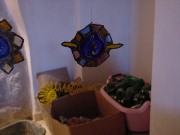 because
of the closures, they have been unable to make the necessary repairs to
fix their intense-heat glass-blowing oven. It is difficult to find a part
of daily life that hasn't been touched by the current situation. The pastor
of Christmas Lutheran Church told us that the church is providing emergency
shelter for families whose homes have been demolished by the regular night-time
bombings of Beit Jala. We chatted with an American volunteer at the church,
who said that almost every night the gunfire and rockets keep him and his
wife awake. Bethlehem has mostly escaped these raids, but is facing a different
devastation. The tourist industry has all but shut down, and almost
all tour groups have cancelled reservations for Christmas 2000 visits to
Bethlehem. The amount of money spent by Palestinians in preparation
for the masses of pilgrims to Bethlehem for Christmas 2000 appears all
but lost at this point. While visiting the Bethelehem Bible College, we
heard two explosions - Israeli tanks responding to Palestinians by hitting
the Paradise Hotel twice. We were reminded that this town is not immune
from violence, either. Even though we returned early to Zababdeh, we were
exhausted. Such events take an unseen toll on everyone. because
of the closures, they have been unable to make the necessary repairs to
fix their intense-heat glass-blowing oven. It is difficult to find a part
of daily life that hasn't been touched by the current situation. The pastor
of Christmas Lutheran Church told us that the church is providing emergency
shelter for families whose homes have been demolished by the regular night-time
bombings of Beit Jala. We chatted with an American volunteer at the church,
who said that almost every night the gunfire and rockets keep him and his
wife awake. Bethlehem has mostly escaped these raids, but is facing a different
devastation. The tourist industry has all but shut down, and almost
all tour groups have cancelled reservations for Christmas 2000 visits to
Bethlehem. The amount of money spent by Palestinians in preparation
for the masses of pilgrims to Bethlehem for Christmas 2000 appears all
but lost at this point. While visiting the Bethelehem Bible College, we
heard two explosions - Israeli tanks responding to Palestinians by hitting
the Paradise Hotel twice. We were reminded that this town is not immune
from violence, either. Even though we returned early to Zababdeh, we were
exhausted. Such events take an unseen toll on everyone. |
|
11/26/00: "Yesua' al-Messiah" - Christ the King Sunday. It was a tremendous feast day at the Church of Visitation, with special music and liturgy. A nice reminder of why we came here - to worship the one who came as the king who turned to the world on its head. It certainly feels that way these days! |
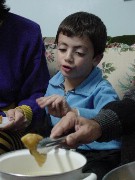 11/28/00:
Marthame made the mistake of explaining a particular vocabulary word using
food as an example. One of the Muslim students replied, "Teacher,
please. Don't talk about food. Today is the first day of Ramadan."
Even in Zababdeh, where most of the people are Christian, the signs of
Ramadan are evident. We shared a traditional Ramadan dessert (sweet
cheese dumplings) with one of our neighbors, even though they are Christian
and so do not fast. Another of our neighbors is Muslim, and Marthame
joined him for some food shopping in Jenin - when you are hungry, you buy
a lot of food! But the meaning behind the practice is clear, as is
fasting in our own faith tradition - we fast because it reminds us that
everything, even the food we take for granted, is from God. And so
the fast is broken with the words "Allahu al-akbar" - God is the most high. 11/28/00:
Marthame made the mistake of explaining a particular vocabulary word using
food as an example. One of the Muslim students replied, "Teacher,
please. Don't talk about food. Today is the first day of Ramadan."
Even in Zababdeh, where most of the people are Christian, the signs of
Ramadan are evident. We shared a traditional Ramadan dessert (sweet
cheese dumplings) with one of our neighbors, even though they are Christian
and so do not fast. Another of our neighbors is Muslim, and Marthame
joined him for some food shopping in Jenin - when you are hungry, you buy
a lot of food! But the meaning behind the practice is clear, as is
fasting in our own faith tradition - we fast because it reminds us that
everything, even the food we take for granted, is from God. And so
the fast is broken with the words "Allahu al-akbar" - God is the most high. |
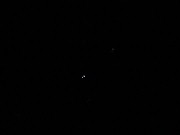 11/29/00:
The airplanes continue to fly overhead constantly during the day.
During daylight, sonic booms come nine or ten times, shaking the windows,
sometimes suprising us so we jump or drop the chalk as we teach, and generally
giving you the impression that the sky is falling and the earth is collapsing.
But late at night, the town is peaceful and the stars are beautiful (unfortunately,
our camera technology isn't that good - we call the picture to the
right "Zababdeh at Night."). We also learned today that our most
recent reflection was published on-line by the Holy
Land Christian Ecumenical Fund. Several readers have sent notes
to us thanking us - this feedback does us a world of good. 11/29/00:
The airplanes continue to fly overhead constantly during the day.
During daylight, sonic booms come nine or ten times, shaking the windows,
sometimes suprising us so we jump or drop the chalk as we teach, and generally
giving you the impression that the sky is falling and the earth is collapsing.
But late at night, the town is peaceful and the stars are beautiful (unfortunately,
our camera technology isn't that good - we call the picture to the
right "Zababdeh at Night."). We also learned today that our most
recent reflection was published on-line by the Holy
Land Christian Ecumenical Fund. Several readers have sent notes
to us thanking us - this feedback does us a world of good. |
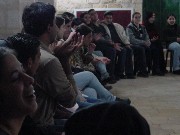 11/30/00:
Celebrations continue following Christ the King Sunday. Today, we
had a special gathering of the university and high school youth for games,
food, and fellowship. There are plans to do this the 30th of each
month, and we look forward to these. We have also learned an important
theological lesson today - Bingo really is a Catholic thing, even
in Zababdeh (and Elizabeth really wants to win next time).
It's also a welcome break from both the situation and school - second quarter
exams are ending, and finals are just around the corner! Is it really
almost December? 11/30/00:
Celebrations continue following Christ the King Sunday. Today, we
had a special gathering of the university and high school youth for games,
food, and fellowship. There are plans to do this the 30th of each
month, and we look forward to these. We have also learned an important
theological lesson today - Bingo really is a Catholic thing, even
in Zababdeh (and Elizabeth really wants to win next time).
It's also a welcome break from both the situation and school - second quarter
exams are ending, and finals are just around the corner! Is it really
almost December? |
|
|
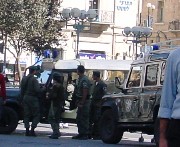
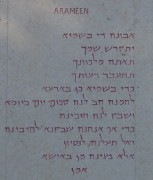 Friday
morning, the day to get our visas, we discovered that the Ministry of Interior
is closed - extending our stay until Sunday, but that ain't bad.
It gave us the opportunity to have coffee with the Patriarch. Security
in the city was unbelievable (soldiers in W. Jerusalem to the left) in
preparation for morning prayers at Al-Aqsa. This Friday, as the last
few, Israeli security did not allow any Palestinian under the age of 45
to enter Jerusalem. Consequently, hundreds of Muslims are stopped outside
the city and prevented from attending their weekly worship. Our guide from
the Patriarchate took us from the Old City just to show us the location
of the Ministry and was worried he couldn't get back into the Old City
from the western part of the city - last week he had crossed the street
to pick up the eucharistic bread for the Patriarch and was barred from
re-entering the Old City. Fortunately, we were not stopped returning,
and there were no incidents near us (though word spread of bombs at different
Gates and the like, none of it apparently true). Our tour guide friend
took us for another free tour. We visited the Mt. of Olives and the
Latin Church of the Lord's Prayer (where you can see the Lord's Prayer
in LOTS of different languages - above to the right, in Aramaic, the language
of Christ). We met up with a very good friend of ours at
Friday
morning, the day to get our visas, we discovered that the Ministry of Interior
is closed - extending our stay until Sunday, but that ain't bad.
It gave us the opportunity to have coffee with the Patriarch. Security
in the city was unbelievable (soldiers in W. Jerusalem to the left) in
preparation for morning prayers at Al-Aqsa. This Friday, as the last
few, Israeli security did not allow any Palestinian under the age of 45
to enter Jerusalem. Consequently, hundreds of Muslims are stopped outside
the city and prevented from attending their weekly worship. Our guide from
the Patriarchate took us from the Old City just to show us the location
of the Ministry and was worried he couldn't get back into the Old City
from the western part of the city - last week he had crossed the street
to pick up the eucharistic bread for the Patriarch and was barred from
re-entering the Old City. Fortunately, we were not stopped returning,
and there were no incidents near us (though word spread of bombs at different
Gates and the like, none of it apparently true). Our tour guide friend
took us for another free tour. We visited the Mt. of Olives and the
Latin Church of the Lord's Prayer (where you can see the Lord's Prayer
in LOTS of different languages - above to the right, in Aramaic, the language
of Christ). We met up with a very good friend of ours at 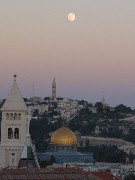
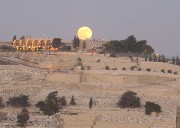 Saturday
provided us with the opportunity for much-needed rest. In a small
world kind of way, we bumped into one of Marthame's classmates from the
U of C in the Old City. We also joined an American Catholic tour
group for dinner in a grand old hotel. They, some of the only other
Americans in town, were "following the footsteps of Christ" as they visited
kibbutzes and churches. Were they going to meet or worship with any
of their fellow Christians in the "Holy Land", we inquired? Why,
no, that hadn't occurred to them. We wished them safety on their
travels the Bethlehem the next day (currently under full closure as things
worsen in Beit Jala and Beit Sahour) and suggested they might want to try
finding living, breathing Christians. We also shared tea and conversation
with the pastor of St. Andrew's Church of Scotland and his wife.
Politics and current events are on everyone's mind. It's exhausting.
We have heard reports of gunplay in Zababdeh in our absence. It worries
us and, in a strange way, makes us long to be there in solidarity.
We had a vacant Church of the Holy Sepulchre to ourselves (
Saturday
provided us with the opportunity for much-needed rest. In a small
world kind of way, we bumped into one of Marthame's classmates from the
U of C in the Old City. We also joined an American Catholic tour
group for dinner in a grand old hotel. They, some of the only other
Americans in town, were "following the footsteps of Christ" as they visited
kibbutzes and churches. Were they going to meet or worship with any
of their fellow Christians in the "Holy Land", we inquired? Why,
no, that hadn't occurred to them. We wished them safety on their
travels the Bethlehem the next day (currently under full closure as things
worsen in Beit Jala and Beit Sahour) and suggested they might want to try
finding living, breathing Christians. We also shared tea and conversation
with the pastor of St. Andrew's Church of Scotland and his wife.
Politics and current events are on everyone's mind. It's exhausting.
We have heard reports of gunplay in Zababdeh in our absence. It worries
us and, in a strange way, makes us long to be there in solidarity.
We had a vacant Church of the Holy Sepulchre to ourselves (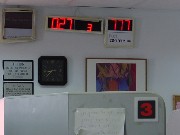 Sunday
was a day of waiting (left - we were number 46) for our visas - which we
got without a hitch. Unfortunately, because of the waiting, we missed
a chance to worship at St. Andrew's. We took a couple of buses to
get to Nazareth, and have never felt more unsafe than when we set foot
on our bus in Tel Aviv as the only civilians. We also got to visit
with friends of ours working with Mission Volunteers International and
engaged in a variety of interesting Christian support ministries in Nazareth.
We were graciously hosted for the night at Nazareth's French Sisters' Hospital.
Our night of good rest quickly evaporated.
Sunday
was a day of waiting (left - we were number 46) for our visas - which we
got without a hitch. Unfortunately, because of the waiting, we missed
a chance to worship at St. Andrew's. We took a couple of buses to
get to Nazareth, and have never felt more unsafe than when we set foot
on our bus in Tel Aviv as the only civilians. We also got to visit
with friends of ours working with Mission Volunteers International and
engaged in a variety of interesting Christian support ministries in Nazareth.
We were graciously hosted for the night at Nazareth's French Sisters' Hospital.
Our night of good rest quickly evaporated.